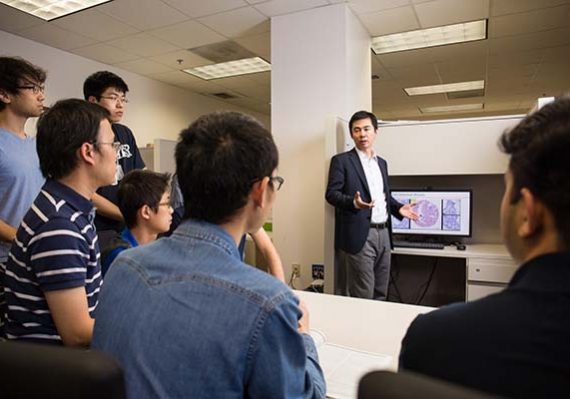Congratulations to Dr. Lin Yang, an associate professor in the J. Crayton Pruitt family Department of Biomedical Engineering and Hamadi McIntosh, a BME PhD student, who were recently awarded a Research Supplement to promote diversity in health-related research by the NIH National Institute of Arthritis and Musculoskeletal and Skin Diseases (NIH NIAMS).
This supplement was distributed for Dr. Yang’s MuscleMiner R01 award. The supplementary award is designated for the purpose of research focused on the integration of muscle-biopsy image features with genomic data to perform automated multimodal diagnosis of muscular dystrophies. The proposed system will make it possible to validate new image markers for which unimodal diagnosis methods fail. Yang’s new research encompassed by the scope of the supplement supports the original aims of the MuscleMiner R01. The purpose of the Research Supplement is to improve the diversity of the research workforce by recruiting and supporting students, postdoctorates, and eligible investigators from groups that have been shown to be underrepresented in health-related research. Under the award criteria, Dr. Yang will serve as the research mentor for Hamadi who is the predoctoral candidate identified by the award who will perform the work encompassed by the supplementary activities.
MuscleMiner, developed by Yang, is a cloud-enabled imaging and informatics application to help researchers analyze images collected from muscle tissue quickly and discover novel new characteristics associated with muscle diseases. This application gives researchers the ability to archive images, query a database of images and mine the large data sets of images to make connections and distinguish different types of muscle diseases.
The National Institute of Arthritis and Musculoskeletal and Skin Diseases (NIAMS) was established in 1986. The mission of the NIAMS is to support research into the causes, treatment, and prevention of arthritis and musculoskeletal and skin diseases; the training of basic and clinical scientists to carry out this research; and the dissemination of information on research progress in these diseases.
Congratulations, Dr. Yang and Hamadi McIntosh!
